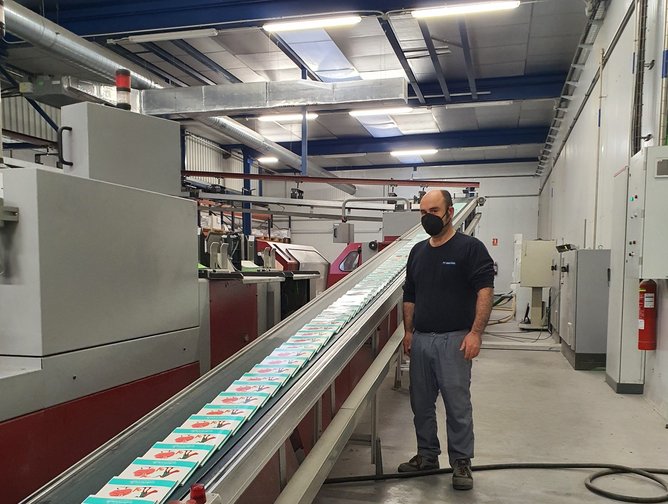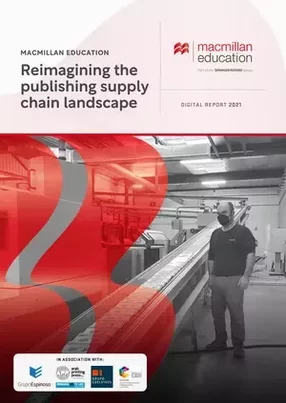Macmillan Education: Reimagining the publishing supply chain
It isn’t every day that you come across an organisation that was founded in the 1800s and is still running to this day. With a 175-year history, Macmillan Education is one of the world’s oldest and most renowned publishing houses, providing books, digital tools and educational content to pupils and teachers all over the world. With a local presence in over 120 countries, Macmillan Education works with a global community of teachers and educators whose aim is to leave the world better than they found it by sharing knowledge and advancing learning. It is a company with responsibility at its heart and – along with its parent company Springer Nature – measures and manages its environmental and social impact. In 2019, Macmillan Education reduced the use of plastic in teaching materials and donated over 97,000 textbooks to schools and universities in lower income countries.
So how does an organisation with such a long history function in the hyper-advanced world of today? The simple answer – a transformed supply chain. Providing a bit more depth into Macmillan Education’s operations is Shaun Plunkett, Vice President Global Supply Chain. Plunkett, who joined Macmillan Education in 2016 immediately identified the weaknesses the legacy operating practices presented. He spent the next year or so defining a supply chain transformation strategy to deliver an operating model that would deliver improved cost, service and support growth opportunities.
Shaun is an experienced supply chain leader, with experience of over thirty years. A naturally charismatic and motivated leader, Shaun has a leadership style that is one of engagement and open conversation. In a pre-COVID world, Shaun spent most of his time traveling and meeting people in local offices across the globe in order to better understand their market dynamics, customer needs and to understand what they were expecting of a future supply chain. He also made it a point to meet other internal stakeholders and key supplier partners so he could get the full picture of end-to-end operational practices and measure existing service levels. As an extension to his leadership strategy, Shaun prides himself on being a change agent, someone who is invested in improving processes by challenging the status quo, and raising the bar for service in whatever capacity he can. Shaun has been responsible for delivering a resilient and agile model based on regional supply/ printing hubs with strategic partners in each continent. The strategy has delivered multi-million euro savings across freight, packaging, inventory and production. Speaking further about his strategy for Macmillan Education, Shaun says that the need for reform was imperative, adding “The operation I inherited was Far East-focused, where a team of about 30 would report into me, source and brings books to our single warehouse in the UK, and then ship books in some cases out again back to Asia. So you can imagine there were some inefficiencies there.” Soon after he presented his findings to Springer Nature, Shaun was tasked with the job of creating a supply chain system that cut time, costs and dependencies on this single-region sourcing model. Since the manufacturing was Asia-focused, lead times were significant and this created a non-traversable obstacle for Macmillan Education’s operations. Shaun remembers one of the early conversations with executives at the company about the frustrations that some of the legacy system was bringing on. He says “I could sense the pain, and that level of service was just not going to be acceptable or sustainable, if we were to avoid losing business to our competitors.”
So what do you do when you have an operation that functions out of the UK, sources content from the Far East and distributes around the rest of the world? You organize. And that’s exactly what Shaun did. He established that the forecasting, on which demand was estimated, was not sufficiently accurate - resulting in unnecessary additional costs. He undertook detailed planning and scenario modelling to establish a radical alternative. The new decentralization strategy he devised helped to cut inbound freight costs almost entirely. He adds “The existing model also didn’t meet our sustainability goals as the carbon footprint was way too high.” So he recommended building an integrated supply chain based around local printing and supply. This hub solution – as Shaun calls it – would mean that all the printing, storage and supply could be done from a hub located in each operating country or region around the world, immediately eliminating the long lead times and poor service levels that some clients were facing. After implementation, Macmillan Education’s service levels rose from under 90% to consistently above 99%.
Another factor that contributed to the transformation of the supply chain was the issue of legacy content storage. Files were previously stored traditionally, often sitting with printers or local offices, which led to a significant waste of time and higher risk of version errors. To counter this, Shaun implemented a new digital archive system, meaning all content files were now held up to date and easily distributed to printing partners. He adds, “We’re seeing improvements in quality and a lack of mistakes because we've cleaned up all that legacy content. We now know when we want to print something it's the right book, it has all the right content. And we also know we can print it anywhere anytime on demand, so we have a lot of confidence in that digital supply chain now.”
Over the course of the past year during the COVID-19 pandemic, teachers around the world have had to rapidly adapt to online teaching and learning, and many classrooms have operated remotely for periods at a time. Macmillan Education was adapting to new digital offers already and the pandemic has led to a further focus on a robust digital-only offering, although printed components remain a key ingredient of their blended offer. The pandemic has also brought about barriers on transport, country-wide shutdowns and reduced-capacity workplaces, making the need for decentralised hubs essential for operations to keep running.
Elaborating further on how these hubs work, Shaun mentions that partnerships played a key role in bringing his strategy to life. Notable partners include Grupo Espinosa based in Mexico, Edelvives in Spain, Arab Printing Press in Lebanon and Cloc in the UK. One of Shaun’s first experiences with the hub system took place in Singapore, where he observed an entire production, warehousing and fulfilment operation under one roof. This was the catalyst for Shaun’s decentralised model, and he soon met with other partners in order to convince them to make investments and transform their infrastructure. To his surprise, he wasn’t met with resistance, as the partner companies soon realized that transforming their own operations could mean a higher volume of production and the potential to sell on the model to other clients. These partners recognized the mutual benefit, with Grupo Espinosa – for example - currently printing and delivering nearly 1.5 million books per year for the company.
In the summer of 2020, when Lebanon experienced a catastrophic explosion at their port, one warehouse partner lost their entire facility. Incredibly Arab Printing Press was able to remanufacture all local requirements in 2 weeks and our third party logistics vendor found an alternate warehouse within days.
Edelvives, a long term partner based in Spain, has been transforming its operations in line with the hub model by acquiring a new warehouse and installing print on demand equipment. Cloc, based in London, is the local partner in the UK and has introduced a fast track digital printing service in order to support print on demand services and eliminate unnecessary waste.
When it comes to sustainability, Macmillan Education has made notable strides in ensuring they use sustainably sourced paper for all publications. They have also reduced the use of plastic globally, eliminating shrink-wrapping and packaging wherever possible – amounting to millions fewer items of plastic in use each year. As a business, Springer Nature has committed to supporting delivery of the UN’s sustainable development goals, and so as a part of the larger organisation, Macmillan Education follows suit.
As a closing statement, Shaun is once again reminded of the challenges that lie ahead, but is confident that with the right kind of transformation in place, the future looks bright. He concludes “Macmillan Education is an old organization, I would say, and needed to consider emerging potential risks as the world is moving on. Actually you can't just stay still. People will overtake you and you need to change, and so this has been a roller coaster and fun journey, but there is more to come.”


